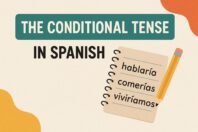Gustar: Conjugation, and How to Use this “Reverse” Verb

Get our free email course, Shortcut to Conversational.
Have conversations faster, understand people when they speak fast, and other tested tips to learn faster.
More infoGustar in Spanish is a verb used to describe something that a subject likes, but this verb looks and acts differently than saying you like something in English.
In Spanish, with gustar, the thing or person that you like is the subject of the sentence, and the person who likes it is the indirect object. Because the indirect object comes before the verb in Spanish, many English speakers erroneously identify it as the subject.
Does that sound confusing? That’s because, for English speakers, it is!
Verbs like gustar can prove to be a real headache for Spanish language learners. Their seemingly backward sentence structure means that they can be challenging to conjugate correctly, and when you begin mixing in complex ideas and tense changes into the mix, things can get a bit sticky.
But once you figure out the structure of one of these verbs, you can use many others like them as well, then you’ll be throwing around a little “me fascina” one day and some “me cuesta” the next, and you’ll realize that your ways of expressing yourself in Spanish have expanded significantly. Once you’ve got the structure down, check out our related post to learn the top 15 verbs like gustar.
In this post we’ll give you a full breakdown on gustar in Spanish. We’ll start with our how-to guide on how to use gustar and other verbs like it, with plenty of examples. Then we’ll dive into gustar conjugation tables for all of the tenses. Let’s get started!
How to Use Verbs Like Gustar With Ease
Flip your thinking upside-down (or right-side-up?)
The first thing you need to do to understand gustar and this particular corner of Spanish grammar is to recognize that the subject of the sentence is the thing that is liked, and the object of the sentence is the person doing the liking.
We’ll go further into detail later on, but to get an overview, let’s look at the sentence, “Me gustan las ensaladas.” In English, that’s “I like salads.”
In English, I am the subject, like is the verb, and salads is the object.
In Spanish, las ensaladas are the subject, then gustar is conjugated to match the subject (thus, gustan and not gusta). The indirect object is me, the person who is pleased by the salads.
Like Yoda speak you must
The second thing to understand is that the order of these words in a sentence is different than in English. The indirect object pronoun (which is me in this case but it could also be te, le, nos, os, les) comes before the verb, instead of at the end which is where objects usually go in English. Because it’s before the verb, sometimes English speakers think that it’s the subject, but if it were the subject, then it would affect the conjugation of the verb gustar, which it doesn’t.
The other thing about the order that is different is that the subject can, and typically does, go at the end of the sentence. If it helps, you can change the sentence to say “Las ensaladas me gustan,” which would also be correct. But regardless of where the salads are in the sentence, they are still the subject, evidenced by how they change the verb according to whether the subject is singular or plural.
At first, you might sound like you’re talking like Yoda. Like the salads, I do! But with some practice, feel natural it will.
Optional: Add a redundant object of who is doing the liking
Since the subject is often reduced to a two- or three-letter pronoun, it’s quite common to repeat who is doing the liking using the preposition “a.” This doesn’t really change how the sentence is translated into English, but it does tell us that the subject is liked “by whom.” We’ll see this construction in many of our examples throughout the rest of this post, but for now let’s just see it again with our salads:
- A mí me gustan las ensaladas. – I like salads.
Get to know other verbs like gustar
There are tons of verbs like gustar out there, but the good news is that they each follow the same structure and rules.
That means once you’ve mastered how to use one verb, you can apply your knowledge to the others. We’ve even put together another post where we introduce the top 15 verbs like gustar, so you can get some practice with them straight away.
For more, you’ll simply need to identify which verbs work like gustar and which don’t. Once you’ve got both of these skills under your belt, you’ll be able to easily navigate sentences with these verbs and begin to incorporate other grammatical elements like a pro.
Commit to practice (and to patience!)
Because so much of this skill comes from exposure and experience working with various conjugations and sentence structures, it’s important to be diligent in your practice. There really is no better way to get comfortable with quickly conjugating and using verbs like gustar than by practicing Spanish conversation and consuming Spanish media regularly.
Also key, though, is keeping in mind the fact that this grammar skill is a true challenge for Spanish learners of all levels.
Be kind to and patient with yourself as you tackle it, and remember that making mistakes is a necessary part of boosting your understanding.
How Do You Use Gustar in Spanish?
Gustar is, without a doubt, one of the most commonly used (and misunderstood) Spanish verbs you’ll encounter, so we’ll begin by taking a closer look at when we use it, why, and how, before moving on to our gustar conjugation tables.
Liking non-person objects, places, etc.
While gustar is used to express the idea of “liking” something, its actual, literal translation is “to please.” Knowing this makes it much easier to understand why we form sentences with gustar the way we do – we’ll be saying that the object in question pleases us (or another person) rather than we “like” the object.
When we’re discussing objects that aren’t people, we use gustar as seen in these examples:
- Me gusta la torta. – I like the cake. – The cake pleases me.
- Me gustan las galletas. – I like the cookies. – The cookies please me.
Notice that the verb “gustar” in these sentences changes not based on the person doing the liking, but instead on the things that are being liked.
In the examples above, gustar takes either the third-person singular or plural form depending on the number of cakes and cookies mentioned.
Also important is the use of an indirect object pronoun to represent the person doing the liking.
Since the thing you like is the subject, we use pronouns to clarify who is doing the liking without changing the tense of the verb.
- Wrong: Yo gusto el gato. – I please the cat.
- Right: A mí me gusta el gato. – The cat is pleasing to me. – I like the cat.
Liking people
What happens when the piece of the sentence that we like or is pleasing to us is a person rather than an object?
We’ll still conjugate gustar or the verb based on the subject (the person being liked, not the person doing the liking). We can also still use indirect object pronouns to specify the subject.
But now, gustar can take on any possible form to modify the person that does the pleasing, so you no longer only have to only worry about whether it’s singular or plural, but also whether it’s first, second, or third person. Take a look at this example:
- I like you. – A mí me gustas tú.
In this example, “tú” is the subject (the person being liked). So, we conjugate gustar to match, which gives us the present tense tú form of the verb (gustas). Even though “a mí” is at the beginning of the sentence, it’s not technically the subject and is only there to clarify who is pleased by the subject.
Remember that in Spanish, you don’t always need to say the subject, so to say that someone likes you, you could say “yo gusto” or simply “gusto.”
| Subject (optional) | Gustar Conjugation: Present |
| Yo | Gusto |
| Tú | Gustas |
| Él, Ella, Usted | Gusta |
| Nosotros, Nosotras | Gustamos |
| Vosotros | Gustáis |
| Ellos, Ellas, Ustedes | Gustan |
Here are some examples using each of these conjugations, with the sentence’s subject (the person or people who are doing the liking) in bold each time:
- Yo le gusto a mi vecino. – My neighbor likes me.
- Tú le gustas a mi hermana. – My sister likes you.
- A él le gusta ella. – He likes her.
- Creo que les gustamos a los niños de la otra escuela. – I think the boys from the other school like us.
- Vosotros les gustáis. – They like you guys.
- Ella no sabe con quien bailar porque todos ellos le gustan. – She doesn’t know who to dance with because she likes all of them.
Gustar and infinitives
When we use gustar and similar verbs followed by an infinitive, we always use the third-person singular form of the verb in our sentence followed by the infinitive:
- Wrong: Me gusta caminando en las mañanas.
- Wrong: Me gustan caminar en las mañanas.
- Right: Me gusta caminar en las mañanas. – I like to walk in the mornings.
A Guide to Conjugating Gustar in All Spanish Tenses
Now that we understand that gustar changes based on the thing or person we like, remember that gustar also has to change depending on the tense.
Here is a helpful method to follow so that you can figure out how to conjugate gustar:
- Identify the subject of the sentence: the thing that pleases the object.
- Identify the tense of the sentence and conjugate gustar to that tense.
- If whatever is liked is a thing, gustar will either be singular or plural: it’s only one of those two options.
- If whatever is liked is a person, change gustar to match the person who is liked.
Now let’s talk about gustar across all tenses so that you can speak like a proper time traveler.
Gustar conjugation chart: Present tense
When working with the present tense, gustar follows regular conjugation rules regarding endings (-o, -as, -a, -amos, -áis, -an). We saw this in the section above, where we use gustar to talk about liking other people.
But, since we’re only concerned about the third-person singular (gusta) or plural (gustan) when talking about things to match the subject, we normally just need to determine which indirect object pronoun is necessary to complete the thought.
| Indirect object complement (optional) | Indirect object pronoun | Gustar present conjugation, singular | Gustar present conjugation, plural |
| A mí | me | me gusta | me gustan |
| A ti | te | te gusta | te gustan |
| A él, A ella, A usted | le | le gusta | le gustan |
| A nosotros | nos | nos gusta | nos gustan |
| A vosotros | os | os gusta | os gustan |
| A ellos, A ellas, A ustedes | les | les gusta | les gustan |
- Me gustan los caballos. – I like horses.
- ¿Te gusta correr? – Do you like running?
- A él le gusta ir al cine. – He likes going to the movies.
- A mi familia y a mí nos gusta esta serie. – My family and I like this show.
- A vosotros os gusta comer carne, ¿no? – You guys like to eat meat, don’t you?
- A ellos no les gusta el libro. – They don’t like the book.
Gustar conjugation chart: Preterite tense
To conjugate gustar in the past, follow the same steps as you would for the present tense to select the correct pronoun and singular or plural version of gustar, then also change your verb to the preterite or imperfect tense.
| Indirect object complement (optional) | Indirect object pronoun | Gustar preterite conjugation, singular | Gustar preterite conjugation, plural |
| A mí | me | me gustó | me gustaron |
| A ti | te | te gustó | te gustaron |
| A él, A ella, A usted | le | le gustó | le gustaron |
| A nosotros | nos | nos gustó | nos gustaron |
| A vosotros | os | os gustó | os gustaron |
| A ellos, A ellas, A ustedes | les | les gustó | les gustaron |
- Me gustó esa película cuando estrenó. – I liked that movie when it came out.
- ¿Te gustaron los tacos de camarón? – Did you like the shrimp tacos?
- La vió, y le gustó. – He saw her and he liked her.
- No nos gustó tanto la torta. – We didn’t like the cake that much.
- ¿Os gustó la profesora sustituta? – Did you guys like the substitute teacher?
- Les gustaron los nuevos diseños. – They liked the new designs.
Remember to use preterite when you’re talking about something you liked in a specific moment, like a movie or a particular meal, and the imperfect when you’re talking about liking something in an undefined, general moment in the past, like something you used to like when you were a child, or when you lived in a certain place. Click through the links for deeper explanations of each tense.
Gustar conjugation chart: Imperfect tense
| Indirect object complement (optional) | Indirect object pronoun | Gustar imperfect conjugation, singular | Gustar imperfect conjugation, plural |
| A mí | me | me gustaba | me gustaban |
| A ti | te | te gustaba | te gustaban |
| A él, A ella, A usted | le | le gustaba | le gustaban |
| A nosotros | nos | nos gustaba | nos gustaban |
| A vosotros | os | os gustaba | os gustaban |
| A ellos, A ellas, A ustedes | les | les gustaba | les gustaban |
- A mí no me gustaban los bichos cuando era niña. – I didn’t like bugs when I was a kid.
- No te gustaba el clima en Santiago. – You didn’t like the weather in Santiago.
- Le gustaban las casas en ese vecindario. – He used to like the houses in this neighborhood.
- Nos gustaban los animales del zoológico. – We used to like the animals in the zoo.
- Os gustaba cuando yo ponía esta música. – You guys used to like it when I would put this music on.
- A ellas les gustaba visitar al abuelo. – They used to like visiting their grandpa.
Gustar conjugation chart: Future tense
You may use gustar to express things that will certainly be pleasing to you or to someone else in the future. See our dedicated post for more details on the simple future tense.
| Indirect object complement (optional) | Indirect object pronoun | Gustar future conjugation, singular | Gustar future conjugation, plural |
| A mí | me | me gustará | me gustarán |
| A ti | te | te gustará | te gustarán |
| A él, A ella, A usted | le | le gustará | le gustarán |
| A nosotros | nos | nos gustará | nos gustarán |
| A vosotros | os | os gustará | os gustarán |
| A ellos, A ellas, A ustedes | les | les gustará | les gustarán |
- Me gustará conocer a tu familia. – I will like meeting your family.
- A ti te gustarán estos sabores de helado. – You will like these ice cream flavors.
- A ella le gustará Argentina. – She will like Argentina.
- Nos gustará este entrenamiento. – We will like this workout.
- Os gustará la próxima clase. – You guys will like the next class.
- A ellos les gustará verte otra vez. – They will like seeing you again.
Gustar conjugation chart: Conditional tense
The conditional expresses things that may be true if certain conditions are met, so when we use it alongside gustar, we’re expressing that we “would like” something rather than we “do like” something.
As in English, this form is often used to add a level of politeness to questions or statements.
| Indirect object complement (optional) | Indirect object pronoun | Gustar conditional conjugation, singular | Gustar conditional conjugation, plural |
| A mí | me | me gustaría | me gustarían |
| A ti | te | te gustaría | te gustarían |
| A él, A ella, A usted | le | le gustaría | le gustarían |
| A nosotros | nos | nos gustaría | nos gustarían |
| A vosotros | os | os gustaría | os gustarían |
| A ellos, A ellas, A ustedes | les | les gustaría | les gustarían |
- Me gustaría saber más sobre el trabajo. – I would like to know more about the job.
- Creo que a ti te gustaría surfear. – I think you would like surfing.
- A ella no le gustarían esos aretes. – She wouldn’t like those earrings.
- Nos gustaría salir a desayunar mañana temprano. – We would like to go out to have breakfast early tomorrow.
- ¿Os gustaría pedir algo más? – Would you guys like to order anything else?
- Les gustaría aprender más sobre los nuevos clientes. – They would like to learn more about the new clients.
Gustar conjugation chart: Present subjunctive
When it comes to the present subjunctive, the only thing you’ll need to change for verbs like gustar is their ending: swap the a out for an e to achieve the right conjugation.
| Indirect object complement (optional) | Indirect object pronoun | Gustar present subjunctive conjugation, singular | Gustar present subjunctive conjugation, plural |
| A mí | me | me guste | me gusten |
| A ti | te | te guste | te gusten |
| A él, A ella, A usted | le | le guste | le gusten |
| A nosotros | nos | nos guste | nos gusten |
| A vosotros | os | os guste | os gusten |
| A ellos, A ellas, A ustedes | les | les guste | les gusten |
- Puede que me guste, pero aún no sé. – I might like it, but I don’t know yet.
- Allí están tus regalos, espero que te gusten. – There are your gifts, I hope you like them.
- No lo compramos hasta que a mi esposa le guste. – We aren’t buying it until my wife likes it.
- Espero que nos guste la obra. – I hope we like the play.
- Ojalá que os guste la comida. – I hope you guys like the food.
- Lamento que no les guste la nueva ubicación. – I’m sorry that they don’t like the new location.
Gustar in perfect tenses
Perfect tenses help us express that an action has begun and is continuing to occur rather than taking place and ending at a specified point in time. To do that, perfect tenses make use of the auxiliary verb haber and a past participle.
Gustar, in this case, will take on the past participle form of gustado.
With these compound tenses, it is the auxiliary verb haber which is conjugated to match the subject and tense. As we saw with the simple conjugations above, remember that with gustar, the conjugation of haber needs to reflect whatever is liked. We still use indirect object pronouns to note who is doing the liking.
We’ll provide simpler conjugation tables for these tenses, showing singular and plural conjugations for each, along with an example. For full-on explanations of each of the following tenses, click through the respective links.
Gustar present perfect conjugation
| Gustar present perfect, singular | Gustar present perfect, plural |
| ha gustado | han gustado |
- Hasta ahora me han gustado las fotos. – So far I’ve liked the pictures.
Gustar past perfect conjugation
| Gustar past perfect, singular | Gustar past perfect, plural |
| había gustado | habían gustado |
- Me fui porque después de dos días no me había gustado el hotel. – I left because after two days I still didn’t like the hotel. – I left because after two days, the hotel still hadn’t pleased me.
Gustar future perfect conjugation
| Gustar future perfect, singular | Gustar future perfect, plural |
| habrá gustado | habrán gustado |
- Estoy segura que después de esta semana me habrá gustado Bogotá. – I’m sure that after this week I will like Bogotá. – I’m sure that after this week, Bogotá will have pleased me.
Gustar present perfect subjunctive conjugation
| Gustar present perfect subjunctive, singular | Gustar present perfect subjunctive, plural |
| haya gustado | hayan gustado |
- Espero que te hayan gustado las nuevas canciones. – I hope you’ve liked the new songs.
Gustar compound conditional conjugation
| Gustar compound conditional, singular | Gustar compound conditional, plural |
| habría gustado | habrían gustado |
- Creo que me habría gustado la seria si fuera más corta. – I think I would have liked the show if it were shorter.
Conclusion: Gustar in Spanish
We’ve covered a lot here, all about this one important Spanish verb that we use to talk about things we like: gustar.
We started off with the basics, explaining the particular “reverse” way we use gustar: rather than the standard construction where the verb is conjugated based on the subject, with gustar you flip things around and conjugate based on what is liked. We use indirect object pronouns to note who is doing the liking, with the optional repetition of this person using the preposition “a.”
Through the rest of the post we looked at gustar conjugation in all the different Spanish verb tenses. Though we saw one conjugation table where gustar was conjugated for all six grammatical persons, this was really just for instances when those were people someone liked… for the most part, we only really need to know the singular and plural conjugation in a given tense, to match whether someone likes singular or multiple people or things.
Hopefully this all gives you a strong understanding on how to use gustar, since it’s such a common Spanish verb. Likewise, its construction is applied to a series of other verbs, like the top 15 that we introduce in our other post about verbs like gustar.
We hope you liked this post! – ¡Esperamos que te haya gustado este artículo!



